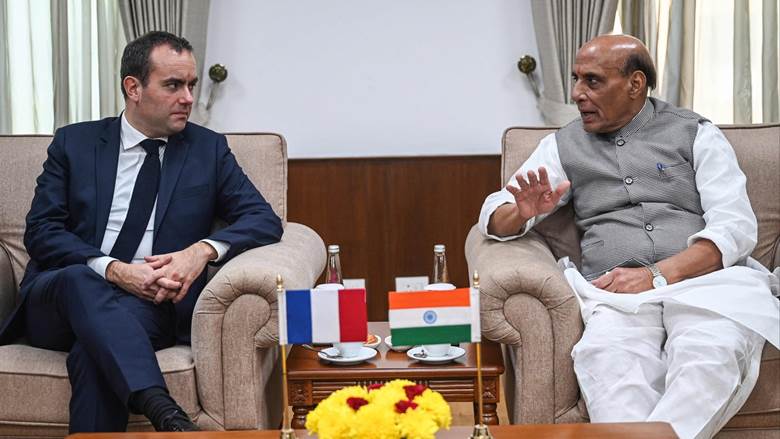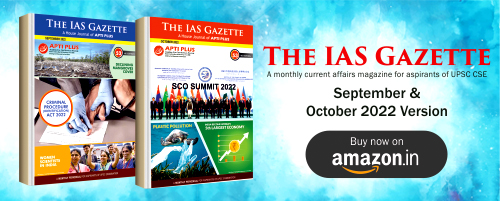Description

Copyright infringement not intended
Context: Raksha Mantri Shri Rajnath Singh held the 4th India-France Annual Defence Dialogue with Minister of Armed Forces of the French Republic Mr Sebastien Lecornu in New Delhi
Details:
- The Ministers reviewed the ongoing military-to-military cooperation which has increased substantially in the recent years.
- They discussed means to strengthen maritime cooperation and increase the scope and complexity of bilateral exercises.
- They noted with satisfaction that India and France recently held their bilateral Air Exercise ‘Garuda’ at Air Force Station, Jodhpur successfully.
- During the dialogue, one of the key areas of discussion was defence industrial cooperation with a focus on ‘Make in India’.
- The Ministers recognised their convergences on number of strategic & defence issues and shared the commitment to work together on enhancing cooperation in bilateral, regional and multilateral fora, with a focus on the Indo-Pacific region.
- France is the current chair of Indian Ocean Commission (IOC) and Indian Ocean Naval Symposium (IONS) and both countries cooperate closely in these fora.
- France is one of India's most trusted strategic partners and both countries look forward to celebrating 25 years of their strategic partnership in 2023.
Background:
- India and France have traditionally close and friendly relations.
- In 1998, the two countries entered into a Strategic Partnership which is emblematic of their convergence of views on a range of international issues apart from a close and growing bilateral relationship.
- The areas of defence & security cooperation, space cooperation and civil nuclear cooperation constitute the principal pillars of the Strategic Partnership.
- India and France also have a robust economic partnership. Apart from these, India and France are increasingly engaged in new areas of cooperation such as maritime security in the Indo Pacific region, counter terrorism, climate change, renewable energy and sustainable growth and development among others.
- India and France share a close degree of convergence on a range of regional and global issues. France has continued to support India’s claim for permanent membership of the United Nations Security Council and the reforms of the United Nations. France’s support was vital in India’s accession to the Missile Technology Control Regime (MTCR), Wassenaar Arrangement (WA) and Australia Group (AG). France continues to support India’s bid for accession to the Nuclear Suppliers Group (NSG).
- India and France have consistently condemned terrorism and have resolved to work together for adoption of the Comprehensive Convention on International Terrorism (CCIT) in the UN.
- The two countries have a burgeoning economic relationship. French businesses and industry have forged linkages with the Indian economy and contribute significantly to our goal to become an Atmanirbhar Bharat. There are over a 1000 French businesses in India in variegated sectors such as defense, ITES, consulting, engineering services, heavy industry et al. France is the 7th largest foreign investor in India with a cumulative FDI stock of USD 9 billion from April 2000 to December 2020, which represents 2 % of the total FDI inflows into India.
- Although India has a trade surplus, India France bilateral trade remains far below potential.In the period April 2018-March 2019, India-France bilateral trade stood at 11.59 billion Euro, India’s exports to France were valued at 6.23 billion Euro meanwhile, French exports to India stood at 5.35 billion Euro.
- The 18th Joint Economic Committee meeting, held virtually between the two countries on 27 November 2020, led to the signing of a bilateral ‘Fast Track Mechanism’ for investors.
- India and France closely cooperated at the peak of the pandemic in both countries. India supplied France with nearly 2 million hydroxychloroquine tablets and 36 MT of paracetamol (API) after having lifted export restrictions on these lifesaving drugs.
- Both India and France have important bilateral investments and trade and commercial cooperation, particularly in sectors involving IT corridors, smart-cities, railways, capital and trade exchanges ,skill development etc.
- France is the 11th largest foreign investor in India with a cumulative FDI stock of USD 9.83 billion from April 2000 to March 2021, which represents 2 % of the total FDI inflows into India.There are more than 150 Indian companies operating in France (including sub-subsidiaries), employing more than 7,000 persons.
- A Joint Economic Committee (JEC/JCM) exists at the level of Ministers of Commerce and Foreign Trade from both sides.
- Joint Working Groups exist in various fields such as (i) IT & Telecommunications; (ii) Roads; (iii) Sustainable Urban Development; (iv) Agriculture and Food Processing; (v) Mineral Exploration and Development; (vi) Energy; (viii) Environment and (ix) Post.
- An India-France CEOs’ Forumexists at the level of top CEOs from both sides meeting annually and presenting their reports to the Prime Minister of India and President of France.
- French side has been actively cooperating with various programmes in especially three Smart Cities, viz. Chandigarh, Nagpur and Puducherry.
- The Bilateral Investment and Protection Agreement between India and France expired in 2010, ten years after coming into force. GoI intends to replace it with a revised Bilateral Investment Treaty. A model text of the agreement was proposed by the Indian side in 2015.
- AFD, the French Agency for Development has, since 2008, committed close to 2 billion Eurosin the form of loans to the State and State-owned companies, as well as technical assistance programs.
- Cooperation in defence is the cornerstone of the India France strategic partnership. The two countries have a Ministerial level Defence dialogue, which has been held annually since 2018. The three services also have regular defence exercises; viz. Exercise Shakti (Army), Exercise Varuna (Navy), Exercise Garuda (Air Force).
- The Inter-governmental agreement for purchase of 36 Rafale fighter aircrafts (30 fighter aircrafts and 6 trainers) by India in flyaway condition was signed in New Delhi on 23 September 2016.
- The contract for six Scorpene submarines from DCNS (Naval Group) was signed in October 2006.
- India and France have a rich history of cooperation in the field of space, since the 1960s with the construction of Sriharikota launch-pad with French technical assistance. Building on the historical linkages in the arena of civilian space, both India and France issued a “Joint Vision for Space Cooperation” during the visit of President Macron to India in March 2018.
- An agreement on civil nuclear cooperation was signed between India and France on 30 September 2008
- France is a founding member of the International Solar Alliance (ISA), announced by PM Modi in 2015 at UN Climate Change CoP21.
- India and France also work together on climate and biodiversity. In this context, India joined the French-led initiative called the High Ambition Coalition for Nature and People in 2021.
- Several other bilateral cooperation programmes exist including an Indo-French Ministerial-level Joint Committee on Science and Technology, established in 2016,
- During EAM’s visit to France in February 2022, the two sides adopted the India France Roadmap on Blue Economy and Ocean Governance. The roadmap rests on four pillars:
- Institutional Pillar
- Economic Pillar
- Infrastructure Pillar
- Scientific and Academic Pillar
- The two countries have several convergences in their respective positions on digital sovereignty, privacy and data protection. The Indo French Roadmap on Cybersecurity and Digital Technologywas signed between the two countries during PM Modi’s visit to France in 2019.
- Indian culture enjoys wide following amongst the people of France. An Indian Cultural Centre, named Vivekananda Cultural Centre, is being opened in Paris.
- The Indian diaspora in France is estimated to be around 5,00,000, majority being French citizens based in the French overseas territories.
- Bilateral consular relations are guided by the following four agreements:
- India-France Extradition Treaty (August 2005)
- India-France Mutual Legal Assistance Treaty (MLAT) in Criminal Matters (10 October 2005)
- India-France Agreement on the Transfer of Sentenced Persons (January 2008)
- India-France agreement on exemption of visa requirements for diplomats (October 2013)

How has India-France relations been?
- After our 1998 nuclear tests, when France declined to impose bilateral sanctions on us and demonstrated a far deeper understanding of India's security imperatives than other nations, we launched a Strategic Dialogue with them.
- Bilateral trade with France has been steadily increasing over the previous decade, and is expected to reach USD 10.75 billion in 2020.The two sides also agreed that moving on with talks on an India-EU trade and investment pact was critical.
- In 2005, a deal was made for the construction of six Scorpène submarines in India with French assistance.
- In 2003 and 2011, joint exercises between the air forces (Garuda series) and armies (Shakti) were established.
- The 36 Rafale aircraft were purchased under a government-to-government transaction.
- Negotiations betweenthe Nuclear Power Corporation of India (NPCIL) and Areva for the construction of six EPR (European Pressurized Reactors) nuclear power reactors with a total capacity of 9.6 GW began around a decade ago.
What are the concerns?
- While the government-to-government relationship is strong, the business-to-business relationship is poor. India's trade with Germany is less than 50% bilateral. The €12 billion aim established in 2008 has yet to be met.
- French FDI has increased in recent years, yet this scarcely reflects the reality that India already has over 800 French companies.
Conclusion
French social security legislation, long-term student visas, and the ability to work for two to three years to pay off student loans are just a few of the issues that need to be resolved in order for the two nations to collaborate more effectively.

https://pib.gov.in/PressReleasePage.aspx?PRID=1879589













